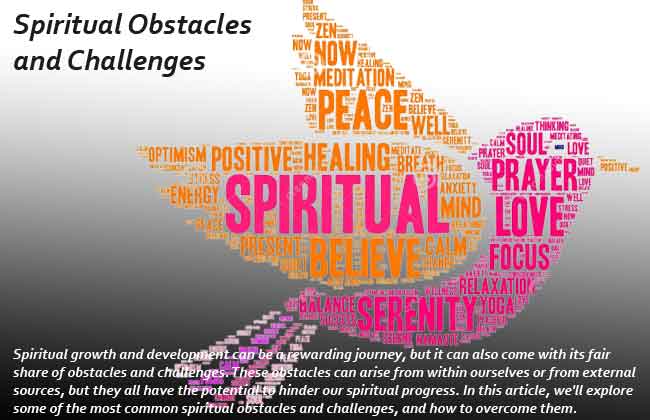Spiritual growth and development can be a rewarding journey, but it can also come with its fair share of obstacles and challenges. These obstacles can arise from within ourselves or from external sources, but they all have the potential to hinder our spiritual progress. In this article, we’ll explore some of the most common spiritual obstacles and challenges, and how to overcome them.
- Fear and Doubt
Fear and doubt are two of the most common obstacles to spiritual growth. Fear can hold us back from taking risks and trying new things, while doubt can lead us to question our beliefs and values. Both can prevent us from connecting with our inner selves and the world around us.
To overcome fear and doubt, it’s important to cultivate a sense of courage and confidence. One way to do this is by focusing on our strengths and accomplishments, and reminding ourselves of the times when we’ve faced challenges and overcome them. We can also practice self-compassion, and learn to treat ourselves with kindness and understanding when we experience fear and doubt.
- Negative Self-Talk
Negative self-talk is another obstacle to spiritual growth. This can take the form of negative thoughts or beliefs about ourselves, such as “I’m not good enough” or “I don’t deserve happiness.” These thoughts can lead to feelings of low self-worth and can hinder our ability to connect with our inner selves.
To overcome negative self-talk, it’s important to practice self-awareness and mindfulness. We can learn to identify our negative thoughts and beliefs, and challenge them with positive affirmations and self-talk. We can also focus on our strengths and accomplishments, and celebrate our successes.
- Distractions and Busyness
In today’s fast-paced world, distractions and busyness can be major obstacles to spiritual growth. We may find ourselves constantly distracted by technology and social media, or too busy with work and other obligations to take time for ourselves.
To overcome distractions and busyness, it’s important to prioritize our spiritual growth and make time for spiritual practices such as meditation, prayer, or yoga. We can also learn to disconnect from technology and social media, and set boundaries around our work and other obligations.
- Attachment and Clinging
Attachment and clinging are obstacles to spiritual growth that arise from our desire for material possessions, relationships, or other forms of external validation. We may become attached to these things, and feel that we cannot be happy without them.
To overcome attachment and clinging, it’s important to cultivate a sense of detachment and non-attachment. We can learn to let go of our attachment to material possessions and relationships, and focus on our inner selves and the present moment. We can also practice gratitude, and cultivate a sense of appreciation for the things we already have in our lives.
- Negative Influences
Negative influences can come from external sources such as toxic relationships or environments. These influences can hinder our spiritual growth by draining our energy and undermining our sense of self-worth.
To overcome negative influences, it’s important to set healthy boundaries and surround ourselves with positive and supportive people. We can also practice self-care, and take time to nurture ourselves and our spiritual well-being.
- Ego and Selfishness
Ego and selfishness are obstacles to spiritual growth that arise from our desire for power, control, and recognition. These qualities can lead us to act in ways that are harmful to ourselves and others, and can prevent us from connecting with our inner selves and the world around us.
To overcome ego and selfishness, it’s important to practice humility and compassion. We can learn to put the needs of others before our own, and focus on the greater good. We can also practice gratitude and appreciation for the contributions of others, and work to cultivate a sense of interconnectedness with all beings.
![]()





